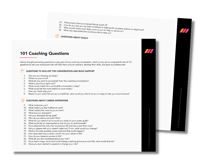5 min read
A Brief Guide to Writing an Employee Coaching Plan (+Template)
It’s one thing to recognize that one of your employees needs coaching from you in a specific area; it’s another to know how to go about it. Even if...
4 min read
 Michelle Bennett
:
Aug 29, 2023 5:00:00 AM
Michelle Bennett
:
Aug 29, 2023 5:00:00 AM

Did you know that over 90% of employees want their direct manager to address performance mistakes or development opportunities in real-time time as they happen? This is because employees want to grow to succeed in their careers, and they can receive these development opportunities through coaching conversations with their direct leader.
Yet, despite employees’ desire to receive coaching and development from their manager, Gallup's study found that only 25% of employees strongly agree that their manager provides meaningful coaching and feedback to them - the type that helps them improve at work, learn, and grow in their careers.
To get started with coaching conversations at work, we’ve compiled everything you need. In this blog, we’ll review the benefits of coaching conversations, topics to cover, the types of coaching conversations to have, and how to get started with a best practices checklist, questions to ask, and a coaching template to use.
When leaders regularly have coaching conversations with their people, it leads to broad-reaching benefits you may have yet to realize. Here are five benefits you’ll experience from having regular coaching conversations.
If you’re one of the seven out of 10 leaders who see developing team members as a top priority, you may be wondering what topics of conversations you should be having with your people. Here are 10 topics that will spur coaching conversations at work.
.png?width=650&height=408&name=10%20Topics%20for%20Coaching%20Conversations%20(1).png)
Whether the goal is to develop a function-specific skill or a transferable skill such as time management, coaching conversations are a prime opportunity to pass on your knowledge and strengths to help those around you become more proficient in their roles.
Direct leaders play an integral role in helping employees identify potential career paths and prepare for them. First, you’ll want to have a career conversation where you work through a career plan that identifies where they want to go and the current gap in their skills to attain that role. From there, you will coach your employee on the skills they need to close the gap to achieve their career aspirations.
Helping employees achieve their goals is central to coaching conversations. During these discussions, you should discuss and set goals, develop an action plan for attainment, and regularly check in on their progress to provide input and feedback to help them learn, grow, and propel forward.
Effective performance management is essential to helping employees develop and grow. Therefore, you’ll want to have frequent coaching conversations where you discuss expectations, identify where employees excel in their roles, or address areas of performance improvement.
Mistakes and setbacks will happen at work; while not a desired outcome, these are opportunities to have coaching conversations to dissect what happened, create plans to ensure it does not happen again, and address any skill development needed that would have avoided the mistake or setback altogether.
We all have blind spots regarding how others perceive us and our behaviors. When you witness a desirable or undesirable behavior or interaction, have a coaching conversation to reinforce what they did well or address the behavior that needs to change.
Coaching conversations often occur when an employee tries to find a solution to a problem or situation. They may even initiate the discussion to get your perspective and insight. While it may be tempting to jump in with a solution, coaching is a conversation, and with the ultimate goal of building their skill and knowledge, you’ll want to guide them through the process by asking thoughtful questions that lead them to a resolution.
Increasing employees' self-awareness is one of the most significant coaching opportunities and outcomes. Whether it is a coaching conversation to discuss their talents and strengths or identifying a blind spot they may not have recognized, coaching is the perfect vehicle to increase self-awareness.
From getting an employee's commitment to accepting new accountabilities, to helping them move up the accountability ladder, to conducting a post-mortem on a successful or failed accountability, these are common topics of coaching conversation in the workplace.
Not all coaching conversations should be about discussing corrective measures or skill development. You should also have coaching conversations where you identify growth and recognize their positive progress to encourage and motivate them to keep going.
Now that you understand the importance of coaching conversations and when to have them, this best practices checklist, list of questions, and coaching conversations template will help you successfully prepare for and have them.
It can be intimidating when you’re new to having coaching conversations. To help you feel more confident, follow the checklist of best practices for coaching conversations at work.

 Asking powerful questions is critical to having productive coaching conversations. Through questioning, you will provoke thoughtful reflection, insight, and learning, helping employees wrestle with identifying solutions and plans for themselves. Here are 101 coaching questions to incorporate into your discussions with employees.
Asking powerful questions is critical to having productive coaching conversations. Through questioning, you will provoke thoughtful reflection, insight, and learning, helping employees wrestle with identifying solutions and plans for themselves. Here are 101 coaching questions to incorporate into your discussions with employees.
 Coaching Conversations Template
Coaching Conversations TemplateHaving a roadmap to follow that helps you navigate a coaching conversation can make all the difference. For example, the GROW model template will prompt you to take a sequential approach to coaching conversations so that both you and your employee get everything you need and can move forward with confidence.
.jpg)
5 min read
It’s one thing to recognize that one of your employees needs coaching from you in a specific area; it’s another to know how to go about it. Even if...
.png)
6 min read
Buzzfeed asked their community of readers to share stories of their best bosses and what made them so great. In the article, there was a common...
.png)
9 min read
Did you know that employees whose leaders are effective coaches are 20% more likely to stay at their company, 40% more engaged with their job, and...